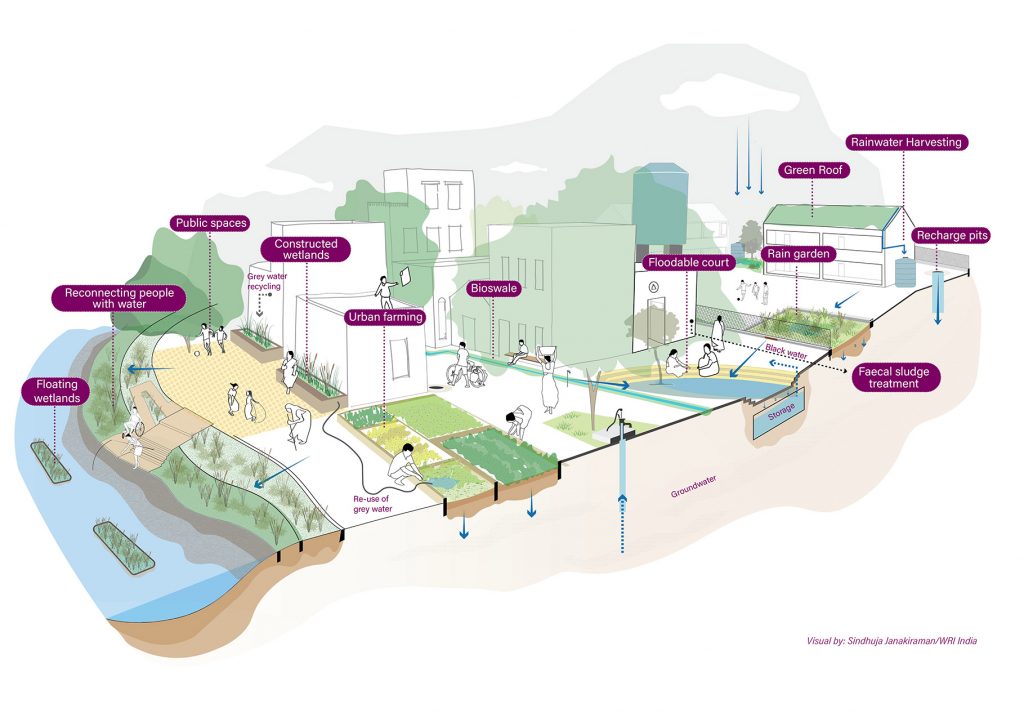About
AIWASI CDP
Vision and Mission

Prioritise SDG 6.1
Inform and guide to prioritize SDG 6.1 for disadvantaged, vulnerable communities and the larger city to achieve universal, equitable access to Water, Sanitation and Hygiene (WASH), leaving no one behind.

Improve Water Security
Improve water security in disadvantaged communities through WSUD Demonstration projects to create liveable, healthy and resilient spaces against climate change and disaster risks.

Implement Participatory Approach

Empower Communities

Transition to a Water Resilient City
Our Work
The AIWASI CDP Demonstration project is designed with Water Sensitive City (WSC) Vision and Gender Disability and Social Inclusion (GEDSI) principles at its very core.
- WATER SECURITY: By 2025, two disadvantaged communities will obtain benefits from improved water security in line with the WSC approach
- COLLABORATIVE GOVERNANCE: Key agencies and communities adopt collaborative water governance arrangements
Water Sensitive Cities (WSC) Vision
The Water Sensitive City (WSC) approach is identified to address social exclusion dimensions such as water scarcity, unequal distribution and rationing, unequal ownership rights over water systems. It also addresses poor water quality and the absence of sewage collection and treatment systems, large distances to water sources etc in urban (disadvantaged) communities especially in the face of climate change-driven shocks.

Urban water management transitions (from ‘big pipes’ to ‘WSC’)
Source: Brown, R.R., Keath, N., Wong, T.H.F., 2009. Urban water management in cities: historical, current and future regimes. Water Science and Technology 59 (5), 847e855
Delhi began its journey as a water supply city and the diagram shows how a city’s relationship with water transitions over time.
The Water Sensitive City (WSC) vision is underpinned by three principles:
- Understanding cities as catchments to provide resources at different scales in fit-for purpose applications.
- Cities provide ecosystem services to integrate urban water management into the urban landscape, providing multiple benefits such as heat mitigation, ecological health and landscape amenity.
- Water conscious communities, where citizens value and are connected to their water environments and engage in water conscious behaviour and water, planning and design professionals work collaboratively deliver water sensitive outcomes.
Why Water Sensitive Urban Design (WSUD)?
BENEFITS OF WSUD
AIWASI CDP aims at design and implementation of WSUD solutions such as decentralized nature-based sewage, stormwater treatment and reuse systems, community-based rainwater harvesting, groundwater recharge systems, and innovative circular solutions at WASH stations etc. These solutions can help in the transition to a WSC by building resilience in vulnerable and disadvantaged communities in the face of climate change and disaster risks.

Incorporating GEDSI (Gender Equality Disability and Social Inclusion)
The AIWASI CDP will be informed by overarching Gender Equality, Disability and Social Inclusion (GEDSI) principles entailing a thorough understanding of the different risks, opportunities, barriers and impacts faced by all sections of the society, including women, persons with disabilities and other marginalized groups. The following GEDSI principles underpin the AIWASI CDP Consortium Partners' commitment to equitable and inclusive programming:
- AIWASI CDP will, at the very least, do no harm to the disadvantaged or vulnerable sections of the subject communities, such that our solutions and approaches benefit everyone equitably.
- AIWASI CDP activities and solutions will strive for transformative approaches* that ensure lasting change towards empowering disadvantaged or vulnerable communities.
- AIWASI CDP activities and solutions will be underpinned by participatory and inclusive approaches that ensure meaningful engagement** from disadvantaged or vulnerable communities.
*Transformative approaches explicitly examine and change institutions and norms that reinforce inequalities and biases against marginalized groups in society.
**Meaningful engagement entails providing iterative opportunities for two-way engagement and dialogue; securing free, prior and informed consent where applicable. It means actively overcoming barriers like cost, illiteracy, asymmetric information, exclusionary institutions and discriminatory norms; and ensuring that all stakeholders’ opinions are not only heard but appropriately incorporated into planning and implementation processes.


